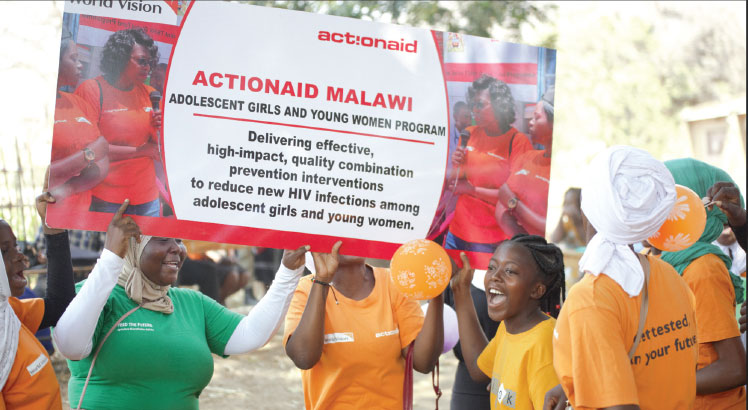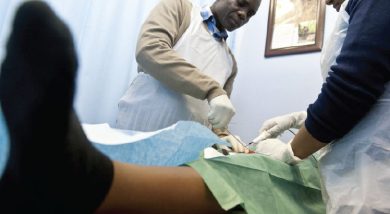Members of the Adolescent Girls and Young Women Project march in Mangochi
In August, 2022, 15-year-old Ana dropped out of school for marriage. Without parental support towards her education, the girl feared she would not realise her dream to become a teacher and a role model for her peers in Chimwala Zone, Mangochi District.
Years back, Ana would have become one of the numerous tales of ruined dreams in the Malawi.
About 46 percent of girls in the country marry before their 18th birthday and nine percent before reaching 15, according to the Malawi Demographic and Health Survey.
The UN Children’s Fund (Unicef) says the main drivers of child marriage are poverty, cultural and religious traditions and peer pressure.
However, marriages for girls like Ana can now wait, thanks to Global Fund’s Adolescent Girls and Young Women (AGYW) project being implemented in Mangochi by ActionAid Malawi.
Since 2021, ActionAid Malawi has been implementing the project in the lakeshore district as a sub-recipient of Word Vision under the Global Fund’s delivery of evidence-based interventions for HIV prevention and support among girls aged 10 to 24.
The initiative seeks to reduce new HIV infections among adolescent girls and young women by increasing HIV and Aids awareness, reducing school dropout rates and combating gender-based violence (GBV).

Mary Douglas Awali, a peer educator trained under the project, rescued Ana from the illicit early marriage.
The volunteer was informed by a Standard Eight teacher about the girl’s prolonged absence from school.
Awali states: “We counselled Ana on the importance of education and we kept mentoring her till she wrote her examinations.
“Ana has since been selected to a secondary school where she is pursuing her dream to become a teacher.”
Assessments show that the project helped withdraw 62 girls from child marriages and brought 147 girls back to schools.
The report indicates that 77 girls have been linked to bursary support, with 49 GBV survivors receiving post-GBV clinical care.
Peer educators work closely with the community rapid response team to support Ana and other rescued girls to realise their dreams
The team comprises representatives from various sectors, including education, health, social welfare, community victim support units, youth organisations, community-based organisations, police, bar owners association and religious organisations.
Team member Issa Chimwala says collaborative efforts have been pivotal in rescuing adolescent girls from illegal marriages and other forms of GBV and get them re-admitted in schools.
“The rapid response team has been key in handling GBV cases and offering the necessary support to girls and young women, including linking GBV survivors to service providers,” he says.
ActionAid Malawi executive director Pamela Kuwali says the non-governmental organisation will not relent to secure a bright future for adolescent girls and young women in Mangochi.
She explains: “Together we have made good progress in these areas, but there is need to continue to work hard to sustain and improve on these gains.
“We also have to address the remaining challenges that the country continue to face in the fight against GBV and HIV in Malawi.”
ActionAid Malawi and World Vision are working in partnership with the Malawi Government to fast-track the 95:95:95 agenda.
This is part of the national strategy to ensure 95 percent of the population know their status, 95 of those found HIV-positive receive treatment and 95 percent of them take treatment consistently until their viral load can neither be detected nor transmitted.
Chimwemwe Mablekisi, a member of the Oversight Body of Malawi’s Global Fund Country Coordinating Mechanism, says it was impressive that AGYW interventions in Mangochi are contributing to the decline in GBV and HIV infections among girls.
He commends all stakeholders under the project for the gains achieved as well as ActionAid and World Vision for supporting the interventions.
“Most importantly, we should also appreciate the role the district council and its structures are playing to ensure that these gains are sustained,” says Mablekisi.





